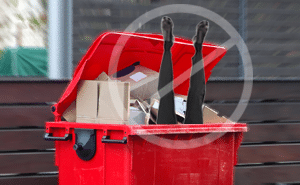Dumpster-Diving: Rubbish, Riches … and Risk

Malone also has a side business, through which he earns thousands of dollars each month selling new items discovered in unlocked Dumpsters on public property.
He stumbled upon this opportunity while evaluating security risks. But among the furniture, electronics, and other valuable products, Malone has turned up boxes – and loose pages – of unshredded confidential data, including driver’s licenses, credit cards, checks, and more.
Dumpster-diving has gained popularity among do-it-yourself enthusiasts seeking discarded furniture that they can breathe new life into with a bit of spit and polish. There are entire websites (and Pinterest pages) devoted to the trend.
But the dark side to Dumpster-diving lies in tech-savvy thieves, who use seemingly innocent information to wreak havoc on individuals and businesses. Statistics compiled by IdentityTheft.info indicate that approximately 15 million Americans have their identities used fraudulently each year, resulting in more than $50 billion in financial losses. Businesses that have elaborate IT security measures in place often discard hard-copy documents without a second thought.
A host of federal, state, and local laws require businesses to follow secure procedures in regard to discarded sensitive and private information:
• The Health Insurance Portability and Accountability Act (HIPAA) covers medical information
• The Gramm-Leach-Bliley Act (GLB) contains guidelines pertaining to financial institutions
• The Fair and Accurate Credit Transaction Act (FACTA) is an amendment to the Fair Credit Reporting Act, which protects consumers from identity theft
• The Federal Privacy Act of 1974 requires government agencies to safeguard the information held by them in regard to individuals and businesses
• The Economic Espionage Act enforces proper handling of sensitive and private information – including trade secrets – but only protects “companies who take ‘reasonable measures’ to safeguard their information”
Among these “reasonable measures” is the requirement that “documents be shredded prior to disposal.”
Since it is true that one man’s trash is another man’s treasure, you can trust EcoShredding’s shred-on-site service to help ensure that your office’s trash doesn’t include the kind of treasure identity thieves are looking for!
Call EcoShredding today at 770.490.5607.


